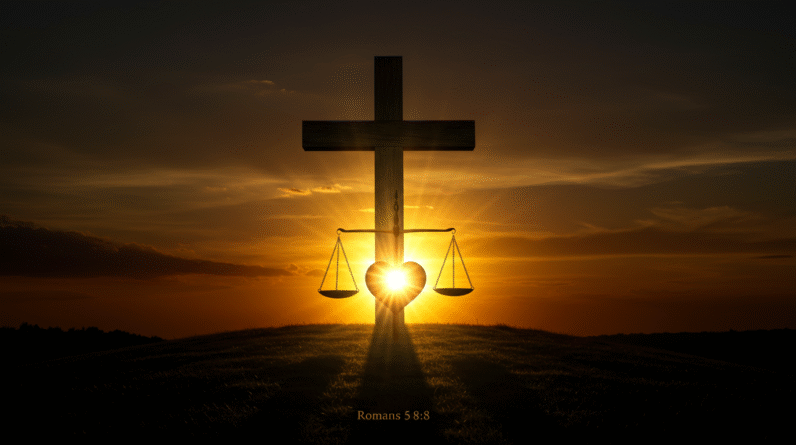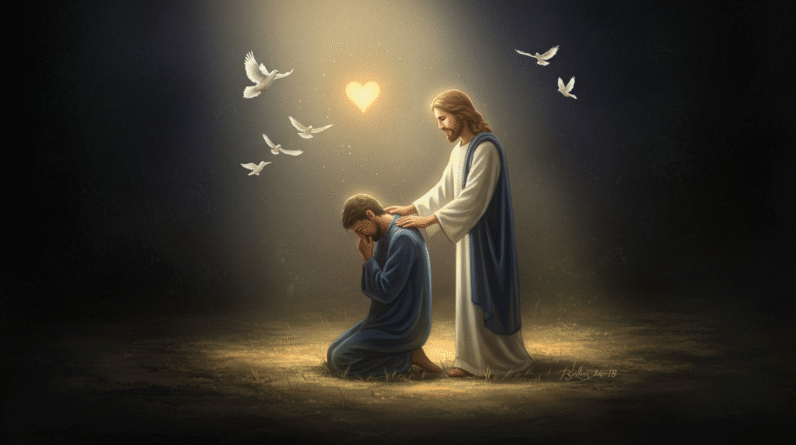God’s Justice Defends The Oppressed (Psalm 103:6)
When you open the Bible and read the words, “The LORD works righteousness and justice for all the oppressed,” you are listening to a promise that reaches into the deepest hurts of the human heart. Psalm 103:6 reminds you that God is not indifferent to suffering; He actively works on behalf of those who are downtrodden and cast aside. Read the verse for yourself here: Psalm 103:6. As you study this promise, you’ll find it woven through the whole story of Scripture: God’s mercy and His justice both move toward a world made right.
Understanding Psalm 103:6
When you look at Psalm 103, you find a hymn of thanksgiving that praises God for His many mercies—He heals, forgives, redeems, and crowns you with love and compassion. Psalm 103:6 sits at the heart of that song, anchoring praise in action: God actually “works righteousness and justice.” To see the wider context, read Psalm 103:1-5 here: Psalm 103:1-5. Those opening verses lift your heart to God for His personal care; verse 6 then assures you that this care includes a firm commitment to righting wrongs.
When you hold this verse in your hands, you should feel both comfort and challenge. Comfort, because God’s justice is not remote or abstract; it’s personal and redemptive. Challenge, because divine justice calls believers to be agents of that justice in the world. David’s song affirms that you are not left alone under oppression: your God sees, remembers, and acts.
The Immediate Context in Psalm 103
As you read the psalm, notice how the author combines tender imagery—“compassion,” “love,” “merciful”—with images of power and eternal faithfulness. This balance helps you understand how God’s justice is exercised: not as vindictiveness, but as restorative action rooted in covenant love. If you want to read the full psalm, follow this link: Psalm 103. The psalmist’s confidence invites you to join in praise, trusting that God’s justice defends those who cannot defend themselves.
The Character of God’s Justice
When you think about justice, you might picture courts and judges, laws and penalties. Biblical justice includes those elements but goes deeper: it’s the outworking of God’s character—His holiness, His righteousness, and His steadfast love. You see this combination again in passages like Psalm 9:9, which calls the LORD “a refuge for the oppressed, a stronghold in times of trouble”: Psalm 9:9. God’s justice is therefore both shelter and action.
You should also understand that God’s justice is redemptive. It aims to restore broken relationships, to make wrongs right, and to heal communities that have been damaged by sin. That’s why Scripture pairs justice with compassion so often: God judges, but He also cares for victims and seeks their restoration. His justice is not mere retribution; it’s the moral energy that moves the world back toward the shalom He intends.
Justice and Righteousness as Divine Action
The Bible frequently emphasizes that God “does” justice. In Exodus, for instance, God hears the cry of the Israelites in bondage and moves to deliver them. Read Exodus 3:7-8, where God says He has seen the suffering of His people and will rescue them: Exodus 3:7-8. That passage shows you that justice isn’t a passive property of God; it’s an action—He acts on behalf of the oppressed.
As you reflect on these passages, ask yourself: Do you trust a God who will act? Do you believe that His justice is personal enough to step into your own situations of pain and injustice? The Bible invites you to that trust.
God Protects the Oppressed Throughout Scripture
When you scan the pages of Scripture, you see a repeated pattern: God sides with the weak, the widow, the orphan, the foreigner, and the poor. These are not side comments; they are central to God’s covenant character. Consider Deuteronomy 10:18, where God is described as the Defender of the fatherless and the widow: Deuteronomy 10:18. God’s special concern for those on the margins shows you that He measures righteousness not by ritual performance but by how you treat the vulnerable.
Isaiah calls you to active compassion when he says, “Learn to do right; seek justice. Defend the oppressed.” Read Isaiah 1:17 and hear the call: Isaiah 1:17. If you are a follower of Christ, this verse should stir your heart into practical response—not merely theological assent.
Old Testament Examples of Divine Concern
Throughout the Old Testament, you find images of God rescuing the oppressed. Psalm 72:12-14 envisions the king delivering the needy and saving the children of the poor, even from violence: Psalm 72:12-14. These verses paint a picture of justice that reaches into the personal, rescuing individuals from harm and restoring dignity.
You also see prophetic calls to care for those whom society neglects. The prophets rebuke leaders who exploit the poor and call the people back to covenant justice. Their words remain relevant: God’s justice is always about right relationships and restored communities.
Jesus and the Justice of God
If you want to see God’s justice embodied, look to Jesus. In the Gospels, Jesus’ ministry is full of acts that defend the oppressed, heal the sick, and release those who are captive—not only physically but spiritually and socially. Jesus begins His public ministry by quoting Isaiah 61, saying He was anointed “to proclaim good news to the poor… to set the oppressed free.” Read Luke 4:18-19, where Jesus announces this purpose: Luke 4:18-19. When you read those words, you understand that the gospel is inherently good news for those who suffer injustice.
Jesus did not separate mercy from truth. He challenged the religious establishment when they kept people in spiritual and social bondage. He lifted those whom society had pushed down. In doing so, He revealed the heart of God—compassionate, righteous, and just.
Parables and Actions that Illustrate Justice
Jesus taught with parables and actions that turned social assumptions upside down. Consider the parable of the Good Samaritan (Luke 10:25–37): a man ignored by his religious neighbors is helped by an unexpected outsider, and Jesus says to you that love of neighbor is the essence of the law. Read the story here: Luke 10:25-37. Through that tale, Jesus shows that real justice includes practical mercy.
On the final judgment, Jesus identifies with the oppressed—feeding the hungry, welcoming strangers, clothing the naked. In Matthew 25:31-46, you find a sobering reminder that your treatment of “the least of these” matters eternally: Matthew 25:31-46. The justice Jesus speaks of isn’t merely punitive; it’s relational. It’s about whether you reflect God’s heart to those in need.

Justice and Mercy Together
You might wonder how justice and mercy fit together. Do they contradict, or do they complement each other? Scripture shows you there are two sides of the same divine coin. Micah 6:8 summarizes what God requires: “To act justly and to love mercy and to walk humbly with your God.” Read Micah 6:8 and let it settle in your soul: Micah 6:8. When you follow God, you are called to both right action and tender compassion.
Psalm 85:10 captures this union poetically: “Mercy and truth have met together; righteousness and peace have kissed.” See Psalm 85:10 here: Psalm 85:10. When you read this, you should be reminded that a truly Christian response to injustice never abandons mercy, and true mercy never shirks justice.
The Church’s Role in Balancing Both
As you live out your faith, you will be tempted to swing too far in one direction: either focusing only on mercy and ignoring wrongdoing, or emphasizing justice at the expense of compassion. The New Testament warns against both extremes. James tells you that mercy triumphs over judgment (James 2:13), but he also insists that faith without works is dead (James 2:14-26). See James 2:13 here: James 2:13. Your calling is to hold both truths together—show compassion while working to make things right.
Practical Implications for the Church and for You
The Bible’s teaching on justice is not theoretical; it’s practical. If God defends the oppressed, the church should too. This means faithful proclamation of the gospel, acts of mercy, public advocacy, compassionate service, and disciplined personal righteousness. Isaiah gives you a striking model of what true worship looks like: it’s not just ritual; it’s loosening the chains of injustice and sharing your bread with the hungry. Read Isaiah 58:6-7 and hear the demand for active compassion: Isaiah 58:6-7. When you practice that kind of faith, you are participating in God’s work of justice.
You are also called to speak up. Proverbs commands you to “speak up for those who cannot speak for themselves.” See Proverbs 31:8-9: Proverbs 31:8-9. Your voice can give dignity to the voiceless, influence laws and systems, and bring practical relief.
How a Local Church Can Respond
When a congregation takes Psalm 103:6 seriously, it will express God’s justice in multiple ways: feeding programs, legal aid, advocacy for the marginalized, pastoral care for victims, and public witness against systems that exploit. Psalm 72:12-14 gives an ideal picture of leadership that defends the needy and rescues them from oppression: Psalm 72:12-14. You should encourage your church to pursue both immediate relief and long-term transformation.
How You Can Participate in God’s Justice
You may feel overwhelmed by the scale of injustice in the world, but there are concrete steps you can take that align with Scripture and make a difference. God uses ordinary people to enact extraordinary change. Begin where you are, and remember that faithfulness in small things is the soil in which larger fruit grows.
Minimal list of practical actions you can take:
- Pray fervently for victims of injustice and for God’s wisdom in your response.
- Serve locally—volunteer with shelters, legal clinics, or food banks.
- Educate yourself about systemic issues and listen to those affected.
- Advocate for fair policies and support organizations that align with biblical compassion.
Each of these actions is a way you partner with God’s justice in the world.
Prayer, Humility, and Ongoing Repentance
When you engage in justice work, remain humble and prayerful. Psalm 82:3–4 urges you to “defend the weak and the fatherless; uphold the cause of the poor and the oppressed.” Read it here: Psalm 82:3-4. But you also must guard against pride and the temptation to think your efforts alone will fix everything. Always begin with prayer: ask God to shape your motives, to give you wisdom, and to lead you by His Spirit.
Repentance is also crucial. The church must confess its own failures to act or to act wrongly. That humility opens the door for authentic reconciliation and greater witness.
Balancing Gospel Proclamation with Social Action
You might sometimes hear debates: should the church prioritize evangelism or social action? The Bible shows you they are inseparable. The gospel brings spiritual renewal, and that spiritual renewal leads to social renewal. When you proclaim the good news, you invite people into a life transformed by Christ—a life that will naturally pursue justice and mercy.
Jesus’ mission included both saving souls and redeeming lives in practical ways. He fed the hungry, healed the sick, and confronted injustice. In John 3:16, you find the heart of God’s mission to reconcile the world through love and sacrifice: John 3:16. When you share the gospel, you are offering the ultimate remedy for the sin that causes oppression: reconciliation with God through Jesus Christ.
The Testimony of a Just and Loving Church
When your church combines loving proclamation with compassionate service, you demonstrate the gospel’s power. People who are hungry for justice and for meaning will see a credible witness in a church that lifts up both truth and mercy. The judgment scene in Matthew 25 shows how God counts deeds of compassion as acts done to Him. Read Matthew 25:31-46 again to feel the weight of this reality: Matthew 25:31-46.
Your witness is not only in what you say but in how you act—how you feed, clothe, welcome, and defend.
The Hope of Final Justice
Even as you labor for justice now, you do so with an eye on God’s ultimate judgment and restoration. Scripture foreshadows and promises a day when God will wipe away every tear and make all things new. Revelation 21:4 lifts your eyes to that future: Revelation 21:4. This is the horizon that shapes your hope and sustains endurance—knowing that God will finally right every wrong.
When you believe in that final justice, you’re motivated to persistent action and patient endurance. You don’t work for justice out of despair or meanness; you do it because you have hope that God is moving history toward a redeemed fullness.
Living in the Tension of Now and Not Yet
You live between the “now” of God’s present work and the “not yet” of His final consummation. This tension calls for both urgent compassion and patient faithfulness. The church must embody that tension—acting decisively where it can while trusting God to bring ultimate justice in His time. Psalm 103:6 gives you courage in this tension: you can work for justice because the LORD Himself defends the oppressed now and will complete His work.
A Brief Bible Study Lesson Plan: “God’s Love and Justice through Scripture”
If you want to dig deeper with others, here’s a small lesson plan you can use in a group setting. It’s designed to help you balance God’s compassion with His righteousness and to encourage practical response.
- Opening prayer: Ask God to open your hearts to His truth and to give compassion for the oppressed.
- Read Psalm 103:6 aloud together: Psalm 103:6.
- Reflect on examples of God defending the oppressed (Exodus 3:7–8: Exodus 3:7-8; Deuteronomy 10:18: Deuteronomy 10:18).
- Read Jesus’ mission statement (Luke 4:18-19): Luke 4:18-19. Discuss what this means for your community.
- Study practical passages (Isaiah 58:6–7: Isaiah 58:6-7; Proverbs 31:8–9: Proverbs 31:8-9).
- Action planning: choose one concrete thing your group will do in the next month to defend or serve the oppressed.
- Closing prayer and commitment.
Each step invites you not only to learn but to act—because the gospel calls you to both heart transformation and social engagement.
Encouragement When the Work Feels Overwhelming
You will sometimes feel small against the enormity of injustice. In those moments, remember God’s faithfulness. Psalm 9:9 reassures you that the LORD is a refuge for the oppressed: Psalm 9:9. You are not alone. God’s Spirit equips you to persevere, and your small acts of faithfulness can have ripple effects you cannot foresee.
Keep your eyes on Jesus, who bore the world’s wrongs on the cross and who came as the friend of sinners and the defender of the weak. His life, death, and resurrection give you the power and the model to go on in love and justice.
The Role of Prayer and Repentance
Consistent prayer and ongoing repentance are essential. Pray for victims, for leaders, and for your own heart. Repent where the church or you have contributed to systems of harm. By doing so, you keep your ministry grounded in the gospel and open to God’s renewing power.
Final Reflections: Trusting God’s Justice
As you conclude this study, return to the heart of Psalm 103:6: God works righteousness and justice for the oppressed. Psalm 103:6. Let that promise shape your prayer life, your church’s ministries, and your personal convictions. God’s justice is not merely a theological concept—it’s a living reality that moves into the lives of people who are hurting.
You are called to join in that work: to love mercy, to act justly, and to walk humbly with your God (Micah 6:8: Micah 6:8). Do so with courage, compassion, and a steadfast hope in God’s ultimate victory.
If your heart has been stirred, consider how you can take one practical step this week to defend the oppressed—whether through prayer, service, or advocacy. Remember that God honors faithful responses, however small, because He is the God who sees and acts on behalf of those in need.
Explore More
For further reading and encouragement, check out these posts:
👉 7 Bible Verses About Faith in Hard Times
👉 Job’s Faith: What We Can Learn From His Trials
👉 How To Trust God When Everything Falls Apart
👉 Why God Allows Suffering – A Biblical Perspective
👉 Faith Over Fear: How To Stand Strong In Uncertain Seasons
👉 How To Encourage Someone Struggling With Their Faith
👉 5 Prayers for Strength When You’re Feeling Weak

📘 Jesus and the Woman Caught in Adultery – Grace and Mercy Over Judgement
A powerful retelling of John 8:1-11. This book brings to life the depth of forgiveness, mercy, and God’s unwavering love.
👉 Check it now on Amazon
As a ClickBank & Amazon Affiliate, I earn from qualifying purchases.
Acknowledgment: All Bible verses referenced in this article were accessed via Bible Gateway (or Bible Hub).
“Want to explore more? Check out our latest post on Why Jesus? and discover the life-changing truth of the Gospel!”








